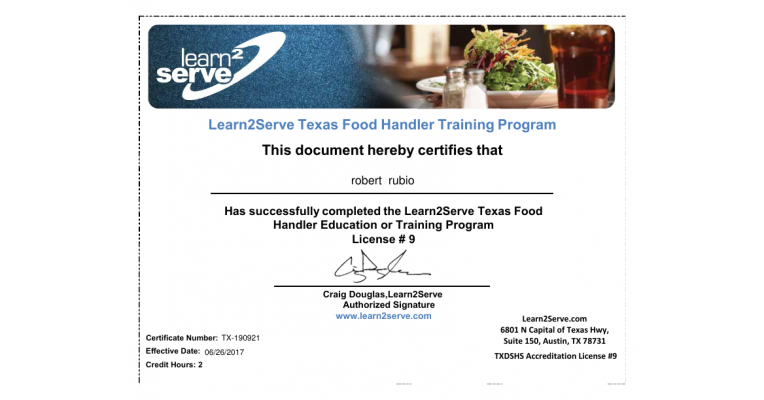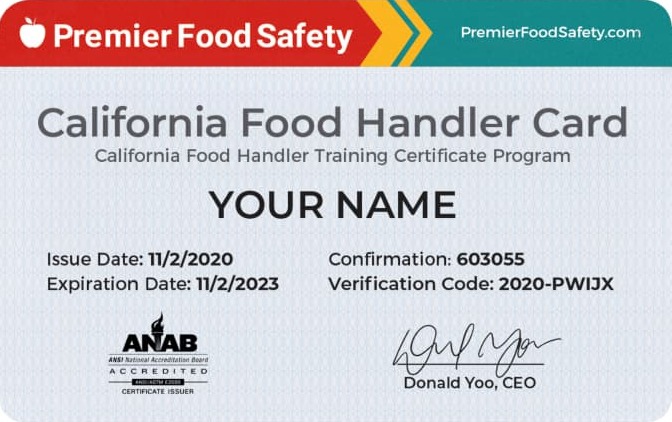Just How ServSafe Food Handlers Certificates Aid Protect Against Foodborne Illnesses
Just How ServSafe Food Handlers Certificates Aid Protect Against Foodborne Illnesses
Blog Article
Learn Food Security Abilities With Comprehensive Food Trainer Qualification
The value of food safety and security in today's culinary landscape can not be overstated, especially as consumer recognition of foodborne ailments expands. Thorough food trainer accreditation offers as a vital step for specialists looking for to enhance their understanding of proper food handling, hygiene, and hygiene techniques.
Importance of Food Security
Food safety is an essential part of public health and wellness that directly impacts the health of consumers. Making sure risk-free food taking care of techniques shields individuals from foodborne illnesses, which can cause extreme health and wellness issues and even casualties. The World Wellness Organization approximates that virtually one in 10 people globally struggle with foodborne diseases every year, highlighting the requirement for stringent food safety procedures.
Additionally, food safety and security is vital for preserving consumer count on the food supply chain. They are a lot more most likely to engage with food establishments and brands when customers are certain that the food they purchase is risk-free. On the other hand, any occurrences of contamination can badly lead and damage track records to considerable monetary losses.
In addition to private health and consumer self-confidence, food safety policies also play a crucial function in the broader economic climate. Conformity with these requirements ensures that services operate within lawful frameworks, therefore minimizing the risk of liability and fostering a fair market. Educating food handlers in effective safety practices is therefore not just a regulative demand, but an essential aspect of making certain a safe setting for all stakeholders associated with food production and consumption.
Introduction of Accreditation Refine
The certification process for food trainers is an organized pathway developed to make sure that individuals possess the necessary knowledge and skills to maintain food safety requirements. This procedure normally begins with an educational element, where prospects receive training on essential subjects such as foodborne health problems, correct food dealing with methods, and sanitation methods.
Educating may be carried out via various styles, including on the internet training courses, in-person workshops, or a combination of both - ServSafe Food Handlers Certificate. Following the conclusion of the training, candidates are required to pass an evaluation that assesses their understanding of the material covered. The test frequently consists of multiple-choice questions, scenarios, and functional evaluations to evaluate candidates' preparedness to apply their knowledge in real-world situations
Upon successful completion of the exam, people are awarded a food handler accreditation, which is typically valid for a certain period, generally ranging from two to five years. This qualification not just improves the employability of food trainers however likewise shows a dedication to preserving high food safety and security standards. It is crucial for food trainers to remain notified concerning the current laws and practices, as recurring education and learning might be needed to renew qualification and ensure conformity with advancing food safety and security regulations.
Key Abilities Acquired
A comprehensive food handler certification program outfits individuals with several essential abilities vital for keeping food safety and security. Among the key skills gotten is the understanding of foodborne illnesses, including their reasons and prevention strategies. This understanding is important for lessening dangers and guaranteeing public health.
Individuals likewise find out appropriate food handling strategies, encompassing risk-free storage, prep work, and offering techniques. This includes understanding temperature control to prevent bacterial development, which is crucial in maintaining food safety and security. In addition, licensed food handlers are learnt check it out the importance of personal health, stressing handwashing and using protective equipment to stop contamination.
Another trick skill is acknowledging the value of cleaning and sterilizing food contact surface areas. The program supplies detailed instructions on reliable cleaning methods and the kinds of sterilizing agents appropriate for different environments. People gain understanding of food safety and security policies and standards, allowing them to conform with regional and nationwide guidelines.
Last but not least, communication abilities are honed, enabling food trainers to pass on crucial info concerning food safety methods to colleagues and management effectively. Collectively, these skills culminate in cultivating a society of safety within food service procedures.
Benefits of Certification
Qualification in food handling provides numerous benefits that expand past individual expertise and skills. Acquiring qualification demonstrates a commitment to food safety requirements, which is essential in maintaining public wellness and count on. This qualification not only improves personal reliability however also signifies to companies and clients a professional commitment to food safety practices.
Furthermore, qualified food handlers are usually more adept at identifying possible dangers and implementing preventative measures, reducing the threat of foodborne health problems. This positive method advantages facilities by decreasing responsibility and making sure conformity with local wellness guidelines, which can lead to fewer evaluations and penalties.
Furthermore, many states and areas mandate food handler qualification as a requirement for work in food service duties. By getting this accreditation, individuals can enhance their employability and open doors to diverse job chances within the food sector.

Occupation Opportunities in Food Security

Opportunities within the area of food safety and security are broadening as the demand for experienced professionals remains to increase. As foodborne ailments continue to be a substantial public health and wellness problem, sectors ranging from agriculture to food service like enhancing their safety and security protocols. This development creates a wide range of occupation courses for individuals with food trainer accreditation and specialized training.
Experts can pursue duties such as food safety auditors, compliance policemans, and quality control supervisors. These settings entail assessing and ensuring adherence to safety criteria, carrying out best techniques, and carrying out training for personnel. Furthermore, with the boosting concentrate on sustainability and natural food sourcing, chances in ecological wellness and security are also increasing.
Additionally, regulatory firms and health divisions call visit here for food security specialists to keep track of compliance with wellness guidelines and perform evaluations. The surge of the food modern technology field has even more broadened profession choices, as firms look for experts in food security to introduce and establish more secure food.
Final Thought

Additionally, food safety and security is important for maintaining customer count on in the food supply chain. Educating food handlers in efficient security techniques is therefore not simply a governing requirement, yet a basic element of making sure a secure setting for all stakeholders included in food production and intake.
It is essential for food trainers to remain notified regarding the newest guidelines and techniques, as continuous education might be called for to renew qualification and make sure conformity with advancing food security regulations.
A comprehensive food trainer accreditation program outfits people with several important abilities crucial for maintaining food safety and security.In verdict, extensive food trainer certification offers as an essential element in guaranteeing food safety within the food industry.
Report this page